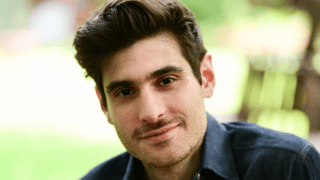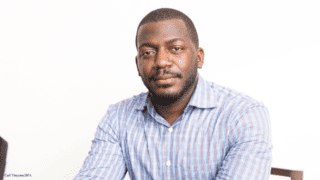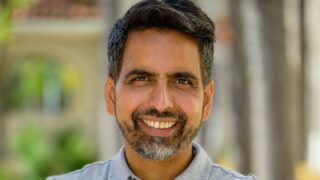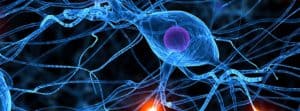The Lavin Agency Speakers Bureau
A speakers bureau that represents the best original thinkers,
writers, and doers for speaking engagements.
A speakers bureau that represents the best original thinkers,
writers, and doers for speaking engagements.
The AI future doesn't have to be a war, but a collaboration. As AI enhances our brains, we can unlock new realms of creativity.
How can we harness the brain for greater creativity—at work, and at school? Leading neuroscientist, internationally bestselling author, and host of one of America’s top podcasts, DAVID EAGLEMAN reveals how any organization can adopt a more innovative mindset by decoding how the mind actually works, and using Artificial Intelligence to enhance it is more important now than ever before. As programs like ChatGPT enter the mainstream, David shows where humans will continue to outshine machines, how to use AI to enhance your own creativity and how to thrive in the unpredictable tech future. “As computers improve, so will we,” he says. “In the battle of man and machine, both are going to get better.” David helps us embrace risk and failure, work with our minds, and build truly creative companies in a new age of technology. The AI future “isn’t going to be a war, but a collaboration.”
“The kind of guy who really does make being a neuroscientist look like fun.”
— The New York Times
To many, creativity is anecdotal: a highly personal, largely mysterious process that either speaks to you or doesn’t. David Eagleman doesn’t see it that way. He starts with neuroscience—how the brain really functions—and shows that innovation doesn’t have to be a private, enigmatic exercise. Knowing how the mind works means we can understand human creativity—and how to harness it to transform companies, classrooms, and creators. This perspective is vividly explored in Inner Cosmos, Eagleman’s tour de force top-ten ranked 2023 podcast that asks, among other things, “Is AI truly intelligent?” Exploring all facets of how our brain affects our experience—“Why is everyone who disagrees with you misinformed?” “How far would you follow authority?” — Eagleman’s show helps us understand ourselves, and others, better. His latest book, The Runaway Species: How Human Creativity Remakes the World is a stunning, full-color collaboration with composer Anthony Brandt on the foundations—and furthest reaches—of creativity. But this isn’t just a celebration of our unique minds: it’s a practical handbook for building more creative companies and institutions. Essentially, it’s about learning how we think—and learning how we can think differently.
Often called the Carl Sagan of neuroscience, he was the scientific advisor on HBO’s Westworld, a bestselling author, and host of the new documentary The Creative Brain, now streaming on Netflix. Whether he’s expounding on the careful balance between routine and novelty, or how leaders can embrace risk and disruption, he provides a vivid, inspiring take on cultivating the right attitude for discovery. As the host of PBS’ Emmy-nominated series The Brain, Eagleman was the charismatic tour guide through the most impressive series—in content and dazzling style—ever produced on neuroscience. A Guggenheim Fellow and winner of the McGovern Award for Excellence in Biomedical Communication, he’s also traded jokes with Stephen Colbert and been featured in Italy’s Style magazine.
“The hottest thing in neuroscience”— The Times
Eagleman’s accolades—both popular and academic—prove his rare ability to make advanced science relevant, accessible, and fun. The Director of the Center of Science and Law, Eagleman is also the founder of BrainCheck, an exciting new app that test neurocognitive functions. Named a Science Educator of the Year by the Society of Neuroscience, he is also a research fellow in the Institute for Ethics and Emerging Technologies and an Adjunct Professor in the Department of Psychology and Behavioral Sciences at Stanford University. His talk at TED on creating new senses for humans—illustrated by his original invention, the VEST (Versatile Extra-Sensory Transducer), which translates sounds into vibrations for deaf users—earned him a standing ovation on the main stage.
His widely celebrated books include New York Times bestseller Incognito: The Secret Lives of the Brain and The Brain: The Story of You, of which Stephen Fry says, “on every page there is a revelation so fantastic as to make one gasp.” His short fiction collection SUM was translated into 27 languages, inspired U2 producer Brian Eno to write twelve new pieces of music (which they performed together at the Sydney Opera House), and was named to Barnes and Noble’s Best Books of the Year. Recently, Eagleman’s critically acclaimed digital book Why The Net Matters was updated and reissued as an e-book (and audiobook) called The Safety Net: Surviving Pandemics and Other Disasters. In it, he reveals why the advent of the Internet has helped us sidestep the existential threats—from pandemics and natural disasters, to political corruption and economic meltdown—that have brought down previous civilizations. Regardless of the audience, Eagleman can unpack the full range of applications (for memory, business, decision-making, technology, education, the law, and more) we get from a more nuanced understanding of the brain—and make it fun.
Eagleman has written for The Atlantic, The New York Times, Economist, Time, Discover, Slate, Wired, and New Scientist, and appears regularly on National Public Radio and BBC to discuss both science and literature. He has been a TED speaker, a guest on the Colbert Report, and profiled in the New Yorker magazine. He has spun several companies out of his lab, including Neosensory, a company which uses haptics for sensory substitution and addition.
David Eagleman was fantastic. Some audience members noted that they felt he was the best speaker of the season, and one even said he was the best speaker from the past ten years! The audience was captivated and wanted more! He was an absolute joy to work with—so organized, humble and easy-going. We were so lucky to end our season with such a positive, upbeat and interesting speaker!
Yahoo.comDavid was great! The feedback has been outstanding and was especially helpful to the smaller project team working on the store traffic issue. Thanks for all your help in making this happen, I couldn't be more pleased with the way it turned out!
The GapDavid Eagleman was one of the most engaging, energetic, intelligent speakers we have had as a keynoter. He is approachable and sincere. We would readily ask him back again without any reservation!
Virginia Association of Independent Schools
Author, A Brief History of Intelligence AI Entrepreneur and Founder of Bluecore Forbes 30 Under 30 Honoree

First Deputy National Cyber Director for Technology and Ecosystem Security Former White House AI Council Member Former Google Global Head of Product Security Strategy

WIRED Global Editorial Director

Author of The State Must Provide: The Definitive History of Racial Inequality in American Higher Education Staff Writer at The Atlantic

#1 New York Times Bestselling Author of How the Word Is Passed and Above Ground Atlantic Staff Writer

Founder and Chief Executive Officer of Khan Academy

Author of Jerks at Work and Job Therapy NYU Professor of Psychology
Bestselling author of Future Tense Clinical psychologist and researcher Digital health technology entrepreneur
Award-Winning Toy Designer of the World-Renowned Rigamajig Founder and Principal Designer at Toy Company Heroes Will Rise

Author of Grit, the #1 New York Times Bestseller | Pioneering Researcher on Grit, Perseverance, and the Science of Success

Pulitzer Prize-Winning Creator of The 1619 Project | Executive Producer of the Emmy Award-Winning 1619 Project Hulu Docuseries | MacArthur Genius
Nike's Former Chief Marketing Officer | Author of Emotion by Design

New York Times Bestselling Author Of All Boys Aren’t Blue and We Are Not Broken | Emmy Nominee | LGBTQIA+ Activist
CEO of The Atlantic | Former Editor-in-Chief of WIRED

Modern AI is blowing everyone’s mind. But is it intelligent like humans, or is it just playing impressive statistical games? Could AI reach or exceed our level of intelligence, and how would we know when it gets there? Traditional tests for intelligence (Turing test, Lovelace test, and others) have long been surpassed. However, Stanford neuroscientist David Eagleman has recently proposed a new kind of test, one predicated on scientific discovery. He explores the current state of the art and future directions of generative AI, including the latest research breakthroughs and promising applications.

With the rapid and unprecedented rise of generative AI technologies like ChatGPT, companies and artists alike are asking what this all means for human creativity. Will ChatGPT replace human workers in creative professions? What are the pitfalls and possibilities for artists? Can a machine innovate?
As a neuroscientist and bestselling author, David Eagleman cuts through the myths around Artificial Intelligence and shows us exactly how our brains work—and why the human element of creativity is more important than ever. He draws on examples from Beethoven to Game of Thrones to demonstrate what AI can (and can’t) do, where humans will continue to outshine machines, and how to use the power of your brain to unleash radical creativity and innovation at work and everywhere else.

We each believe we hold the correct position about politics. Anyone who disagrees with us is ignorant, a troll, or misinformed. If we could simply shout loudly enough in all caps on Twitter, people would realize the unassailable power of our logic. Unfortunately for us, everyone on all sides of the argument genuinely believes the same thing. Why do we each see only our version of the truth, and what does this tell us about how human psychology works? In this talk, Stanford neuroscientist David Eagleman takes no sides. He instead explains how our limited sampling of the world builds an internal model, why we believe our model is complete, and why truths can be so wildly different inside different heads. With this as a launching point, he proposes five methods that we can use to get our public and private conversations back on track.

Companies that want to take the lead in innovation have to wrestle with a three-headed problem: the future is hard to foresee, most ideas die, and even great concepts may not last. So: What does it take to become a truly creative company? In this talk, David Eagleman argues that all organizations must generate ideas—small, diverse, wild ideas, the more the better—to stay ahead in a world that is constantly changing. He’ll show you how to inspire employees and teams to greater heights, to work on “moonshot” concepts, to learn from failures (even fiascos), and to push beyond the expected. This is easier said than done, but Eagleman, the world’s coolest neuroscientist, is up to the task. Using a handful of great examples—and the advanced science that animates them—he shows you that there’s no one true way to innovate, and that the process is itself not set in stone: it’s something to be reconsidered and reinvigorated. Most importantly, he helps leaders break from “cognitive ossification,” which can stall progress through routine and expectation. The path to breakthrough new products and experiences is strewn with bad ideas—but, surprisingly, good ones, too. Eagleman helps us know which ideas to pursue, which to abandon, and why investing in even the most far-reaching possibilities might be the most practical thing you can do for your company.

The brain is often portrayed as an organ with different regions dedicated to specific tasks. But that textbook model is wrong. The brain is not hardwired, David Eagleman contends—it is livewired. In this talk, Eagleman presents his new theory of infotropism: why the fundamental principle of the brain is information maximization. In the same way that plants grow toward light, brains reconfigure to boost data from the outside world. Follow Eagleman on a thrilling journey to discover how a child can function with one half of his brain removed, how a blind man can hit a baseball via a sensor on his tongue, how new devices and body plans can enhance our natural capacities, how paralyzed people will soon be able to dance in thought-controlled robotic suits, how we can build the next generation of devices based on the principles of the brain, and what all this has to do with why we dream at night. You will never think about your brain in the same way again.